People
The AgriLand project is led by a world class team of researchers with expertise spanning a range of disciplines, including pollinator population ecology, honey bee biology, wildflower ecology and plant-pollinator interaction research. Many of the team were instrumental in demonstrating the declines in British pollinators and their host plants and in the first national assessments of the status and trends of honey bees and honey bee diseases (Biesmeijer et al. 2006, Carvell et al. 2006, Potts et al. 2010). Members of the team also have a proven track record in agri-environment research, environmental change monitoring, multi-site research and collaborative science and in the development of important survey and analytical methods that will be invaluable to the success of this project.
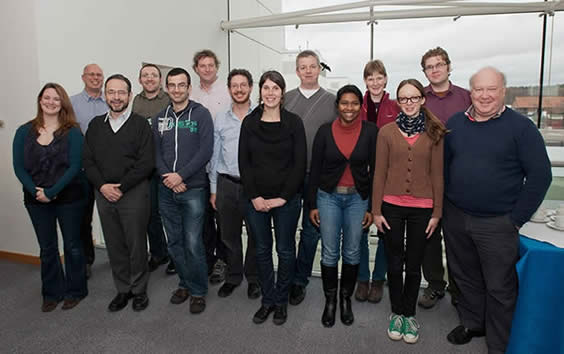
The team is drawn from a range of excellent UK research institutions, and bring with them access to nationwide datasets and specialist expertise in a range of disciplines. The research staff, their institutions and email addresses are listed below:
Project leader: |
Bill Kunin is Professor of Ecology at the University of Leeds, and is the lead investigator of the AgriLand project. Bill was educated in the USA, but has worked in the UK since 1993, first at Imperial College and then at Leeds. His research focuses on spatial patterns in plant populations, and how they affect interactions with pollinators and herbivorous insects. Bill has a long history of collaborative research on agricultural landscapes, including participation in two Rural Economy and Land Use (RELU) projects and several EU grants; he also organised the UKPopNet Research Farm Network. | |
 |
Dr. Mark Gillespie |
Mark Gillespie is a Research Fellow on the AgriLand project at the University of Leeds. Mark was educated in the UK and New Zealand and has been at Leeds since May 2011. His research interests are in insect population and community ecology and plant-insect interactions, particularly with regard to the effects of land use and environmental change. Mark brings to the project a history of research in agricultural settings in New Zealand, the USA and Africa. |
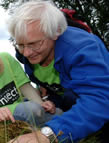 |
Dr. Steve Compton |
Steve Compton is a Reader in Entomology, with interests in plant-animal interactions and the conservation of insects. After a student education in Hull he spent a few years lecturing at Rhodes University in South Africa, before returning to Yorkshire. He has concentrated mainly on the fig-fig wasp pollination system, especially dispersal of the insects and how they adjust their progeny sex ratios. His field work used to be mainly based in Africa, but is now centred on China and SE Asia. He is also a regular visitor to Lundy in the Bristol Channel, where he has been monitoring cabbages and cabbage insects for almost twenty years. |
 |
Prof. Simon Potts |
Simon Potts is Professor of Biodiversity and Ecosystem Science in the School of Agriculture, Policy and Development at the University of Reading. His research focuses on understanding the relationship between land use, biodiversity and ecosystem services, with particular emphasis on pollination and pest regulation, and developing evidence-based adaptation and mitigation options for policy and management applications. He coordinates a number of international projects including the EU FP7 project, Status and Trends of European Pollinators (www.STEP-project.net). |
 |
Mr. Stuart Roberts |
Stuart Roberts is a senior research fellow in the Department of Agriculture at the University of Reading, working on all aspects of bee biology and ecology, and the ecosystem services they provide. His interest in bees began some 25 years ago when he was a school teacher in Dorset. He has been a very active member of the UK Bees, Wasps & Ants Recording Society (BWARS) and has been serving as Chairman since 2005. His experience includes working on projects in Spain, Greece, Bulgaria, Libya, the Middle East and India, as well as acting as a consultant to the FAO. |
 |
Dr. Deepa Senapathi |
Deepa Senapathi is a Research Fellow in the Centre for Agri-Environmental Research, at the University of Reading. Deepa was educated in India and the UK and has been at Reading since 2005 when she joined as a PhD student. Her main research interests include assessing and understanding environmental change impacts on populations and communities. Having worked on climate and habitat change related projects in India and Mauritius, Deepa is currently working on the AgriLand project, examining the impacts of historical land-use change on pollinator communities in Britain. |
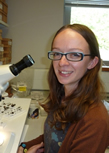 |
Miss Rebecca Evans r.l.evans@reading.ac.uk
|
Rebecca Evans is a research technician working on the AgriLand project at the University of Reading and is overseeing the processing of specimens collected from the AgriLand field work. Rebecca's main interests are in general entomology and taxonomy but with a particularinterest inaculeate Hymenoptera. Before taking up this position Rebecca worked at the Centre for Ecology & Hydrology and as a volunteer at the Oxford University Museum of Natural History. |
Prof. Jane Memmott |
Jane Memmott is Professor of Ecology at the University of Bristol. Her research includes pollination ecology, invasion ecology, agro-ecology, biological control and restoration ecology. She works as both a pure and an applied ecologist and is particularly keen on working at the interface between the two disciplines. Her group uses a wide variety of techniques: from field observation to field experiment, from theory to molecular approaches. Jane is the team leader for another of the UK Insect Pollinator Initiatives: Urban Pollinators – their ecology and conservation. Find out more here. |
|
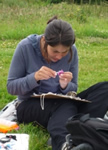 |
Dr. Mathilde Baude |
Mathilde Baude is a Research Fellow on the AgriLand project at the University of Bristol. After her PhD on pollinator foraging behaviour at the University of Paris VI, she concentrated mainly on floral resources and plant-pollinator interactions. She is currently investigating the role of floral resources in pollinator decline, including quantifying the production of nectar and pollen in the most common species in the United Kingdom. |
 |
Nancy Davies nancy.davies@bris.ac.uk |
Nancy Davies is a Research Technician on the AgriLand project based at the
University of Bristol. After completing her undergrad in Environmental Sciences
at the University of East Anglia, she returned to work at Bristol as a Research
Assistant (where she also worked on placement during her year in industry) for
Mathilde Baude on the AgriLand project. She is currently working on the
research into quantifying nectar and pollen production from the UK's
most common flowering species to investigate the role of these
floral resources in pollinator decline. |
 |
||
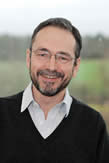 |
Dr Nigel Boatman |
Nigel Boatman is Head of Agri-Environment at the Food and Environment Research Agency. He is an agricultural ecologist and formerly ran a research and demonstration farm for the Game and Wildlife Conservation Trust before joining Fera. His research interests centre on the environmental impacts of agriculture and their mitigation, including socio-economic factors influencing farmers’ decision-making with respect to environmental issues. He has advised policy makers on design and evaluation of agri-environment schemes and the Campaign for the Farmed Environment. Methods employed by his group include field ecology survey, GIS and spatial modelling, farmer surveys and economic analysis. |
 |
Dr. Kate Somerwill |
Kate Somerwill is a Land use Change Scientist working in the Land Use and Sustainability team at Fera. During her Masters at the University of York she focussed heavily on spatial data analysis and processing and has worked in the UK and Europe. She is a GIS specialist and has interests in the environmental impacts of changing land use, especially on biodiversity and ecosystem services, and in the spatial modelling of issues relating to land use |
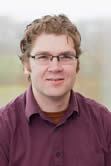 |
Dr. Andy Crowe |
Andrew Crowe is a Senior Land Use Change Scientist at Fera. He completed his PhD at the University of York in 2004 and subsequently worked on projects in the RELU, Countryside Survey and NEA programmes before joining Fera. His work has mostly focused on the spatial analysis of socio-environmental data. Andrew currently works on a number of projects that involve land use and the application of spatial analysis, and as part the Agriland project has been involved with developing maps of cropping, pesticide risk and honey bee forager distribution. |
|
||
Other Project partners |
|
|
References
Biesmeijer, JC et al. 2006. Parallel Declines in Pollinators and Insect Pollinated Plants in Britain and the Netherlands. Science 313, 351-354
Carvell, C et al. 2006. Declines in forage availability for bumblebees at a national scale. Biological Conservation 132, 481-489
Potts, SG et al. 2010 Declines in managed bees and beekeepers in Europe. Journal of Apicultural Research 49: 15-22